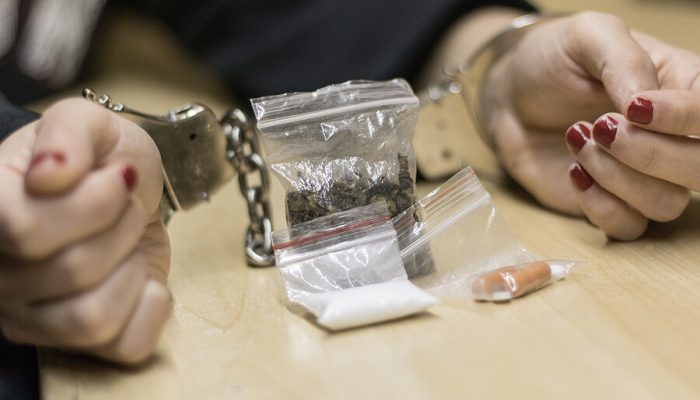If you were arrested surely it was a very traumatic experience. Especially if this is the very first time you have ever been arrested. Kentucky has very strict laws related to controlled substances. Illegal possession of a controlled substance occurs whenever a person owns or otherwise possesses a drug or other controlled substance, without legal justification or permission. These charges usually apply when a person is found carrying marijuana, cocaine, methamphetamines, or other narcotics. To convict someone of illegal possession of a controlled substance, the prosecutor must prove the defendant knowingly possessed the drug. If you were arrested, understanding what happens next could help you avoid mistakes resulting in a harsher sentence. Talking to a drug crime attorney about your charges, whether innocent or guilty, is the best thing to protect your freedom rights.
What Is The Process After You Have Been Arrested For Drug Possession?
After you have been arrested for drug possession, you will be taken to the police station, where processing occurs. Once processing is complete, you will be put in jail. The next step is an arraignment hearing. This is when you are told your rights and receive the bail amount for your situation. An arrest is not a guilty verdict. You should not admit to anything or talk to the police. You should ask for your telephone call. Use that call to call your defense attorney or if you do not know a defense attorney call someone who can find a lawyer for you. If you cannot afford an attorney, request that the court appoint a defense attorney for you. Next will come your arraignment. At the arraignment, the judge will read the charge of drug possession against you and tell you your legal rights. At this time, you can ask about bail. The judge may or may not grant bail – it will depend on the charges against you. If you are granted bail and you can post bond, you will be released from jail pending the resolution of your case.
What Happens If I’m Caught With Drugs But Not Charged At That Moment By The Police?
Make sure to respond in a respectful and direct manner. Resisting arrest or disrespecting law enforcement can lead to increased charges or additional legal issues. If you’ve been caught with drugs but not charged yet, you’ll want to avoid making the situation worse. Felony drug charges do not have a statute of limitation. You can be charged at any time. Misdemeanor drug charges generally must be filed within one year of the crime being committed.
Drugs In Prison Are More Common Than Many Of Us Believe
If you are incarcerated and in jail, beware that you can face the same drug charges and penalties for possession in jail as you would if you’re caught outside of jail. Time could be added to your sentence and penalties could make life in jail much more difficult for you during your time in jail.
You Should Consider Any Drug Possession In Kentucky As A Serious Matter
Drug possession is a severe charge. Believing you can outsmart the police or that your privilege or clean record can help you is a huge mistake. Here are some do’s and don’ts for you to consider:
DO
- Stay calm: Whatever happens, it is recommended that you never allow your emotions to get the better of you.
- Be respectful: If you act combative or uncooperative, you might get yourself in additional trouble. As much as possible, always be polite and respectful.
- Hire a criminal defense attorney: Drug possession is a severe charge. Get in touch with a qualified criminal defense attorney right away.
DO NOT
- Eat your Drugs: A possible misdemeanor case can quickly turn into a felony if you attempt to destroy or hide evidence. Tampering, destroying, or hiding evidence has serious legal consequences, and it’s definitely the last thing you need. It may be your first thought, but this is a massive mistake that you shouldn’t even attempt.
- Never try to talk your way out of being arrested.
- The officers may want you to sign a statement; however, you will not want to sign anything.
Drug possession charges in Kentucky are serious and you won’t want to face criminal charges for controlled substances alone.
Contact us (859-341-2500) for a Free Consultation!
—
 About Grubbs & Landry
About Grubbs & Landry
At Grubbs & Landry, PLLC, we are dedicated to personal and friendly service. We manage our practice in an ethical, cost-effective manner to best help our clients resolve their legal issues with the least expense possible. We pride ourselves in advocating for our client in divorce, child custody, and child support matters as well as other family law matters. We are active in prosecuting personal injury cases-recovering for the injuries our clients sustain due to the negligence of others. Additionally, we help our clients prepare for the future through the preparation of Wills, Power of Attorney and Living Will.



 If you are facing criminal charges, you are probably worried about how they might impact your future– you know you have quite a bit to lose. Being formally convicted brings about the possibility of severe consequences, like fines, time in jail or prison, and so much more. You also risk the loss of your reputation, especially when the charges before you involve violence. This can change your entire future; it’s a lot to take in.
If you are facing criminal charges, you are probably worried about how they might impact your future– you know you have quite a bit to lose. Being formally convicted brings about the possibility of severe consequences, like fines, time in jail or prison, and so much more. You also risk the loss of your reputation, especially when the charges before you involve violence. This can change your entire future; it’s a lot to take in.